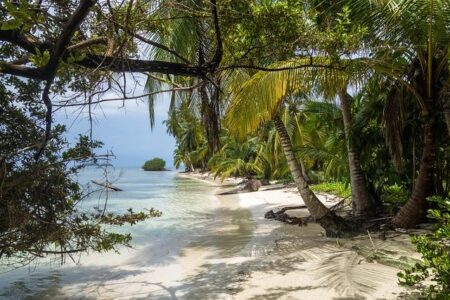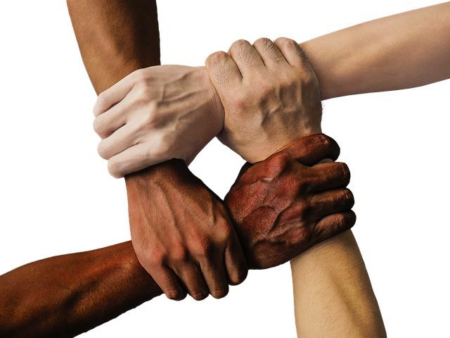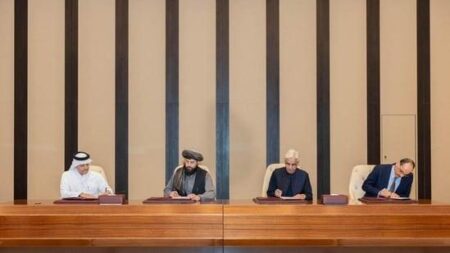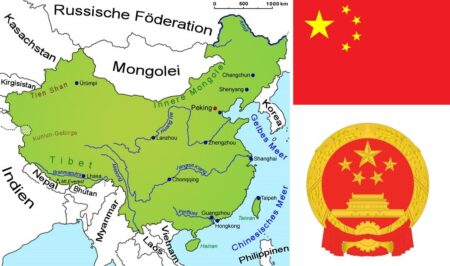Canada’s historic separatist movements are taking an unexpected turn as a rising wave of Albertans push to join the US. This surprising cross-border momentum injects new energy into the national unity debate, igniting complex and urgent political discussions
Browsing: Sovereignty
Panama’s leader dismissed concerns about potential threats from China following a court ruling tied to the Panama Canal. He boldly reaffirmed that the nation remains completely sovereign and is unwavering in its commitment to protecting this crucial waterway
Chatham House affirms that the UK’s ratification of the Chagos Archipelago treaty is solidly grounded in international law, underscoring this move as a strong and legally sound response amid ongoing sovereignty disputes
Former U.S. President Donald Trump fiercely criticized the UK’s decision to return the Chagos Islands to Mauritius, calling it an act of “great stupidity.” This bold move has sparked intense debates over sovereignty and shifting global power dynamics
Former President Trump fiercely criticized the U.K.’s decision to return the Chagos Islands to Mauritius, using it as a powerful example to argue that the U.S. should take control of Greenland. He expressed these bold opinions in a recent interview with NPR
Former US President Donald Trump has fiercely criticized the UK’s recent agreement on the Chagos Islands, calling it an “act of great stupidity.” This contentious deal, which returns control of the islands to Mauritius, has sparked a storm of diplomatic tensions
Nordic countries have strongly dismissed former President Trump’s claims about Chinese and Russian naval activity near Greenland, stressing that there is no evidence of any unusual military presence in the region, according to a Financial Times report
France boldly stakes its claim to reject U.S. demands, signaling a powerful shift in Europe’s diplomatic stance. This move highlights escalating tensions and a resolute drive for greater independence in transatlantic relations
Spain has boldly declared that Venezuela’s natural resources belong solely to its people, championing national sovereignty and firmly opposing any external exploitation, according to TRT World. This powerful statement highlights the rising tensions over resource control in the region
Legal expert Donald Rothwell exposes how the US violated international law in Venezuela, igniting urgent questions Australia must face about its stance on sovereignty and intervention in global conflicts
Chinese Foreign Minister vehemently denounces US military strikes on Venezuela, branding them a blatant violation of international law and a serious threat to Venezuela’s sovereignty, reports the Global Times
The African Union and Somalia have fiercely condemned Israel’s recognition of Somaliland, branding it a bold challenge to Somalia’s sovereignty. This provocative move has sparked intense diplomatic tensions and unleashed widespread criticism throughout the region, underscoring long-standing territorial conflicts
The New York Times delves deep into the fierce territorial clashes between Russia and Ukraine, highlighting key flashpoints and unraveling the intricate diplomatic struggles that keep tensions simmering along their hotly contested borders
China has urged the UK to steadfastly uphold the “one-China” principle, emphasizing the vital importance of respecting its sovereignty over Taiwan. This call comes amid rising tensions in the region, Reuters reports
Taiwan Premier Cho Jung-tai boldly declared that Taiwan will never return to China, highlighting the island’s steadfast determination to protect its sovereignty amid rising cross-strait tensions, The Jerusalem Post reports
Chinese Coast Guard vessels boldly patrolled the waters surrounding the Japan-administered Senkaku Islands, escalating tensions in the hotly contested East China Sea. This daring move underscores the ongoing and fierce territorial rivalry between Beijing and Tokyo
Amid the stalemate in Afghan-Pakistan talks, India has once again reaffirmed its unwavering support for Afghanistan’s sovereignty and territorial integrity, urging peaceful dialogue to pave the way for lasting stability in the region, NDTV reports
A crucial Pacific gateway underscores the Kremlin’s stronghold over Russia’s remote Far East, spotlighting Moscow’s relentless drive to expand its influence and protect its vast, resource-rich frontier amid growing regional tensions
China has accused the Philippines of a ship collision near a fiercely contested shoal in the South China Sea, escalating tensions in this already volatile region. Amid rising conflict, both nations have urged restraint and called for calm as maritime disputes continue to simmer
Barry Appleton raises a red flag on Canada’s fading sovereignty, as the U.S.’s “algorithmic empire” tightens its hold-igniting urgent questions about who really controls our data and digital world while American tech giants dominate Canada’s digital infrastructure



















